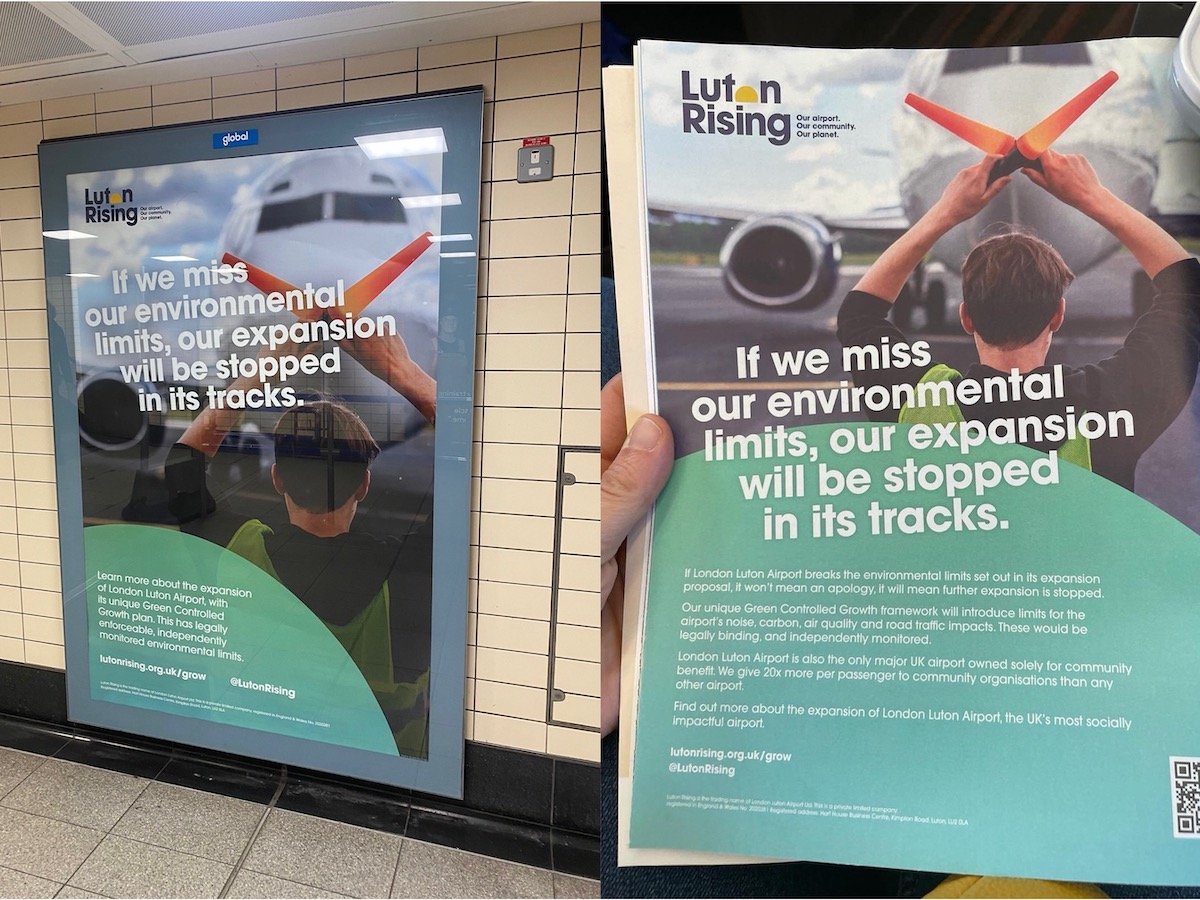Badvert of the month: Luton airport's "green" expansion ads banned
In this month’s Badvert, we look at adverts for London Luton Airport, which were banned for greenwashing the airport’s expansion plans by the Advertising Standards Authority (ASA) on 10 July 2024.
In the precedent-setting ruling, reported in the BBC, Guardian, Business Green and Campaign, the UK ad watchdog banned the ads for misleading the public over the climate impacts of Luton Airport’s proposed expansion from 18 million to 32 million passengers per year.
Luton Airport, which (controversially) goes by the trading name Luton Rising, launched adverts on facebook, billboard and print adverts in early 2024 to promote its “unique” “green” growth plans. The ads, which were seen on posters in London Victoria tube station and in the New Statesman magazine, were placed in the run up to a critical decision on the airport’s expansion in May 2024.
The ads, by Hope advertising agency, promoted the airport’s expansion, with imagery and rhetoric painting a picture of the highest environmental standards: “If we miss our environmental limits, our expansion will be stopped in its tracks”.
The ads promoted “environmental limits” set in Luton Airport’s “Green Controlled Growth Framework” – but this Framework does not include emissions from flights, which make up more than 80% of the airport’s current climate impacts before non-CO2 impacts are included.
The airport’s proposed expansion would lead to an estimated 70,000 more flights per year by 2043, which would create noise, greenhouse gas emissions, NOx pollutants and high-altitude contrails. Omitting flights from the environmental standards promoted in the ads was “misleading” according to the regulator, who warned Luton Airport that any future advertising must not omit material information about the environmental impact of its proposed expansion.
Adverts in London Victoria Underground station and the New Statesman Magazine promoted Luton airports “green” expansion plans.
The UK’s Climate Change Committee (CCC) has advised the Government to halt airport expansions until there are better measures to control the greenhouse gas emissions of aviation, a highly polluting sector that has widely missed its voluntary climate commitments and is currently lagging behind other industries in efforts to decarbonise.
In January 2024, Amsterdam’s Schiphol Airport shocked the sector when it announced a suite of new rules to become “quieter, cleaner and better”, including a ban on night flights and private jets, and a commitment to no further expansion - abandoning plans for an additional runway.
Luton Airport’s expansion proposals, which include a new terminal to accommodate an additional 14 million passengers per year, have been strongly opposed by local resident groups and adjacent Hertfordshire, North Hertfordshire and Dacorum councils. The ads appeared in the run up to the Government’s decision on Luton’s application to expand, which has now been delayed to 4th October 2024.
This is the first time the ASA has banned airport ads for making false green claims, after complaints made by Badvertising and our partner campaign Adfree Cities, the Stay Grounded network, climate charity Possible and a number of local airport expansion opposition groups. The ruling should set a precedent for other airport expansion advertising, which is often a major source of greenwashing and an under recognised influence on public and political perceptions of airport expansion.
Read the ASA’s full ruling here.
Company background: Hope advertising agency worked on a full rebrand of Luton Airport to Luton Rising (with the controversial tagline “our airport, our community, our planet”) in 2021. The airport is owned by Luton Borough Council but managed by the private sector London Luton Airport Operations Limited (LLAOL).
In 2019, pre-pandemic, Luton Airport’s total greenhouse gas emissions (scopes 1, 2 and 3) were 1,341,235 CO2e, of which 83.7% was from aviation (1,123,074 t CO2e). Just 1.3% (17,149 t CO2e) was from airport operations. These figures also do not include the non CO2 impact caused by flights, which have been shown to multiply the warming effects of the carbon by up to three times.
Luton Airport has applied to the UK Planning Inspectorate to expand, proposing to increase the capacity of the airport from 18 million to 32 million passengers per year.


